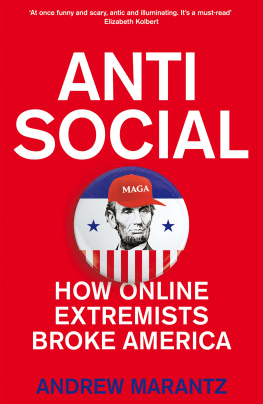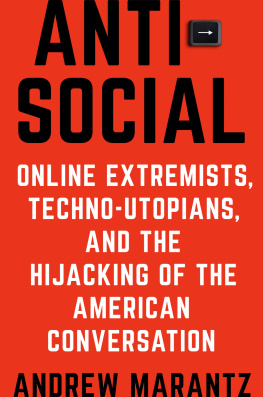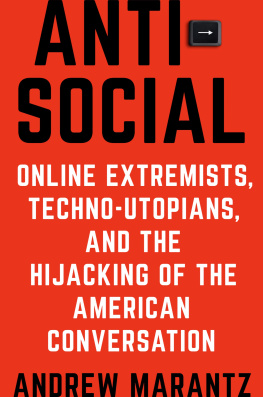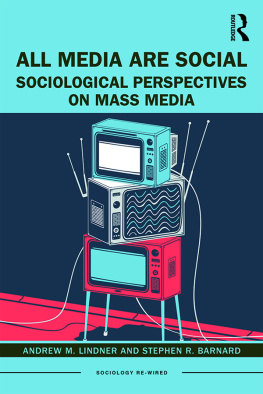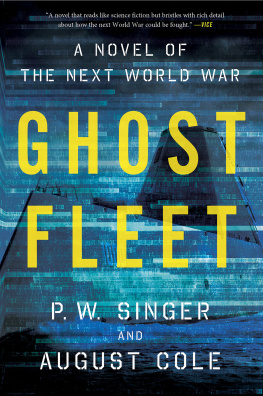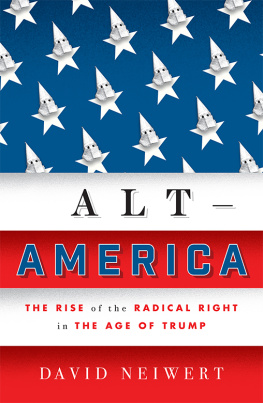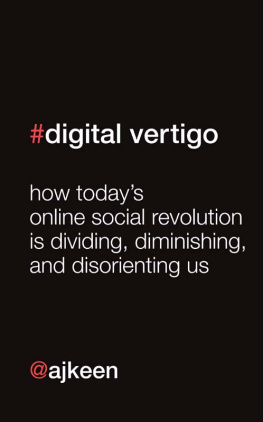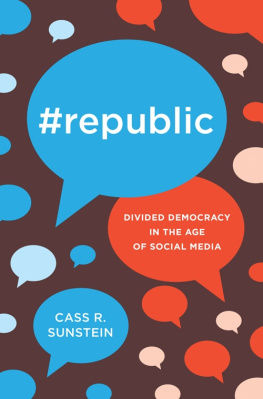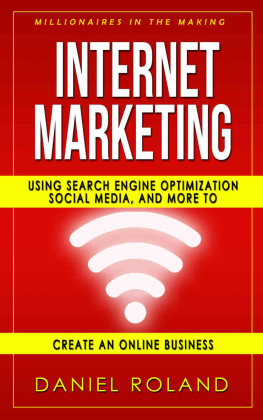For LBG and the Gid
Morality, if it is to remain or become morality, must be perpetually examined, cracked, changed, made new.... Not everything that is faced can be changed; but nothing can be changed until it is faced.
James Baldwin, As Much Truth As One Can Bear
Under all this dirt
the floor is really very clean.
Lydia Davis, Cant and Wont
Contents
- PART ONE
DeploraBall - PART TWO
A Human Superpower - PART THREE
Too Big to Ignore - PART FOUR
The Swamp - PART FIVE
The American Berserk - PART SIX
A Night for Freedom
Guide
ANTISOCIAL , ADJ. (1797)
- unwilling or unable to associate in a normal or friendly way with other people (Hes not antisocial, just shy)
- antagonistic, hostile, or unfriendly toward others; menacing; threatening (an antisocial act)
- opposed or detrimental to social order or the principles on which society is constituted (antisocial behavior)
- Psychiatry: of or relating to a pattern of behavior in which social norms and the rights of others are persistently violated
Dictionary.com Unabridged
Based on the Random House Unabridged Dictionary, Random House, Inc. 2019
Prologue
I landed at the Bob Hope Airport in Burbank, rented a Ford sedan, and asked Google to send me southward on a semiefficient route, scenic but without too much traffic. As I drove, I listened to a nationalist motivational speaker delivering far-right talking points via livestream. I was deprived of the full effect, being unable to see his facial expressions and the comments floating up the left side of my phones screen, but I figured that the full effect was not worth dying for. Are you gonna be a passive observer in these extraordinary times, as we fight to save Western civilization, or are you gonna step up? he asked. Ive decided that Im stepping up. The 2016 presidential election was approaching, and the institutional gatekeepers in government, business, and media all agreed that the result was inevitable. The nationalist was urging his listeners to question the prevailing narrative, to think the unthinkable, to bend the arc of history. Through my windshield I could see a sliver of the Pacific, picturesque but not all that pacific.
On the Hermosa Beach boardwalk there were longboards and mirrored sunglasses and poke bowls and matcha smoothies. A small film crew from Women.com was shooting a series of woman-on-the-street interviews about sex positivity. On the beach, a crowd had gathered around a drum circle. Can you feel the Earths rhythm? one of the drummers asked, passing around a bucket for donations.
I spotted about a dozen beefy white men, dressed in T-shirts and shorts, milling around near an outdoor bar. In the middle of the scrum was the nationalist motivational speaker. Most people on the boardwalk didnt recognize him, but to his followers, both in person and on the internet, he was something of a hero, or maybe an antiheroan expert at injecting fringe ideas into mainstream discourse. A few months earlier, he had decided, based on no real evidence, that Hillary Clinton was suffering from a grave neurological condition and that the traditional media was covering it up. He turned this conjecture into a meme, which gathered momentum on Twitter, then leaped to the Drudge Report, then to Fox News, and then into Donald Trumps mouth. The nationalist had told me, All the people at each step may or may not know my name, but Im influencing world history whether they know where their ideas are coming from or not.
He was hosting what he called a free-speech happy houra meetup for local masculinists, neomonarchists, nihilist Twitter trolls, and other self-taught culture warriors. About sixty people showed up over the course of the afternoon. Some refused to call themselves alt-right, which had become, in their words, a toxic brand; others were happy to own the label. Most were white, most were nationalists, and some were white nationalistsnot the old skinhead type but the more polished, just-asking-the-question variety. For years, theyd been able to promote their agenda through social networks like Twitter and Facebook, with almost no restrictions. Now those networks were starting to crack down, banning a few of the most egregious trolls and bigots. Its straight-up thought policing, one person at the meetup said. Its 1984.
A pudgy guy with oversized sunglasses sat at a table by himself. On his T-shirt was a drawing of Harambe, a gorilla whod recently been shot to death at the Cincinnati Zoo. The incident had resulted in real internet outrage, followed by satirical internet outrage, followed by absurdist metacommentaries on the phenomenon of internet outrage. All afternoon, I saw people pointing at the guys T-shirt and laughing as they passed by. Fuck yeah, Harambe, theyd say, or Dicks out for Harambe. The guy wearing the T-shirt would nod knowingly, as if in solidarity. That was the extent of the interaction.
I sat down next to the guy and asked him to explain the joke. Its a funny thing people say, or post, or whatever, he said. Its, likeits just a thing on the internet. Harambe, of course, was a real animal before he became a meme. Still, I knew what it was like to experience much of life through the mediating effects of a screen. It wasnt hard for me to imagine how anythinga dead gorilla, a gas chamber, a presidential election, a moral principlecould start to seem like just another thing on the internet.
For as long as the United States has been a country, there have been Americans handing out pamphlets declaring taxation unconstitutional, or standing on soapboxes railing against papist sabotage, or calling C-SPAN to demand that every member of Congress be investigated for treason. (C-SPANs screeners, if they were doing their jobs, did not put those callers on air.) The First Amendment protected this minoritys right to speak, and for a long time it seemed as if the majority were not inclined to listen. There have always been those on the fringes of our society who have sought to escape their own responsibility by finding a simple solution, an appealing slogan, or a convenient scapegoat, President John F. Kennedy said in 1961. But in time the basic good sense and stability of the great American consensus has always prevailed.
In 2004 and 2005, a few young men wrote the computer code that would grow into a vast industry called social mediasocial because people could receive information horizontally, from their friends, rather than waiting for gatekeepers to impart it from on high; media because information was information, whether it came from a stilted broadcaster, a kid procrastinating during study hall, or a nationalist on a boardwalk. The social media entrepreneurs called themselves disrupters, but they rarely described in much detail what a postdisruption world would look like. When pressed, their visions tended toward hazy utopianism: they expected to connect people, to bring us all closer together, to make the world a better place.
Their optimism wasnt entirely misguided, of course. Millions of peoplewhistleblowers, citizen journalists, women resisting abuse, dissidents under despotic regimesdid use social media to organize, to reveal abuses of power, to advance the aims of justice. And yet, when the same tools were used to sow disinformation or incite hatred, the disrupters usually responded by saying something vague about free speech and then changing the subject.

